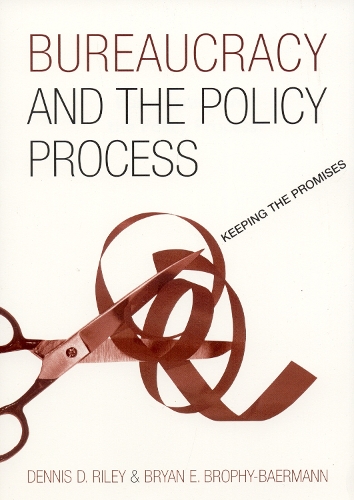
Bureaucracy and the Policy Process: Keeping the Promises
(Paperback)
Publishing Details
Bureaucracy and the Policy Process: Keeping the Promises
By (Author) Dennis D. Riley
By (author) Bryan E. Brophy-Baermann
Bloomsbury Publishing PLC
Rowman & Littlefield Publishers
21st December 2005
United States
Classifications
Tertiary Education
Non Fiction
320.6
Physical Properties
Paperback
424
Width 177mm, Height 253mm, Spine 46mm
721g
Description
The central role that bureaucracy plays in the policy process is played by individuals, namely, by subject matter experts and managers we call political executives. These executives do not play their role in a vacuum, of course, but in a context defined by three key forcesthe organizational environment of bureaucracy itself; our governing philosophy stressing responsiveness, respect for individual rights, and accountability; and the demands of the people and the institutions those people have created to govern themselves. This book explores how these three forces collide and how the resulting collision shapes the way in which bureaucracy makes policy, as well as the final product of that policy making process. It provides an in-depth look at each of these forces, with chapters specifically devoted to how bureaucrats interpret their role in the policy process, how the organizational environment influences their ability to play that role, and, most of all, to the interactions between bureaucrats and the institutions of what we call the Constitutional government: the President, the Congress, and the courts. It does this, all the while reminding us that fitting bureaucracy into a society that views itself as self-governing is no easy task.
Reviews
Bureaucracy and the Policy Process is a stimulating and accessible introductory text on American public administration and policy-making. * Political Studies Review *
The Constitution doesn't mention it, yet the bureaucracy has become the largest 'branch' of government and the most influential in the daily lives of Americans. How did this happen Why do we have a bureaucracy Who are the bureaucrats What do they do and why These are the questions answered in Bureaucracy and the Policy Process. Dennis Riley and Bryan Brophy-Baermann present an engaging, accessible, and thorough exploration of the bureaucracy, humanizing the people in it, and dissecting the political context surrounding it. -- Sheldon Gen, San Francisco State University
Author Bio
Dennis D. Riley is professor of political science at University of Wisconsin, Stevens Point. Brian E. Brophy-Baermann is visiting instructor in government at Lawrence University in Appleton, Wisconsin.
